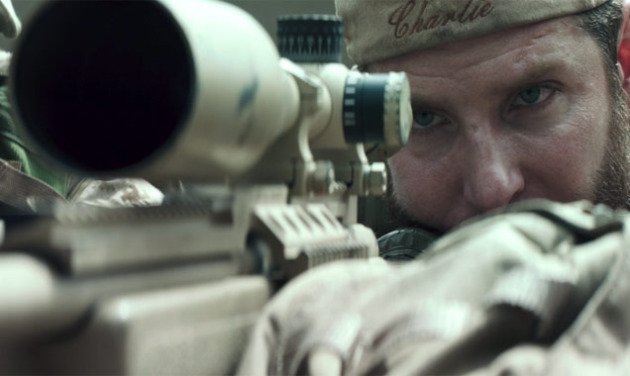It was incredibly hard to watch American Sniper. My first serious activist experiences were as part of the anti-war movement before and during the 2003 invasion of Iraq. The prospect of watching a two-hour long justification—or, more accurately, glorification—of the war was not particularly exciting.
Watching it as Barack Obama seeks congressional authorisation for a three year military operation against Islamic State felt even more ominous.
Obama says that, “The so-called Islamic State of Iraq and the Levant (ISIL) poses a threat to the people and stability of Iraq, Syria, and the broader Middle East, and to US national security.”
It is this same “threat” to US citizens that drives Chris Kyle (played by Bradley Cooper) to enlist with the Navy’s Sea, Air, Land Teams (SEALs) in the aftermath of the bombing of US embassies in Kenya and Tanzania. It is clear from the opening credits that there is little room for nuance in Kyle’s world. The roll of tanks and the patter of gunfire are set against the background of the call to prayer. All Iraqis are fair game in Kyle’s world.
The first hour of the film feels like a videogame. There is very little in the way of dialogue as Kyle amasses his reputation amongst the SEALs by killing at an unparalleled rate. He kills with little to no thought and certainly no remorse. There is not one Iraqi that can be trusted throughout the entire film. Kyle tells his wife between his first two tours, Iraqis are just “fucking savages”. As he handles one Iraqi man early in the film he proclaims, “I don’t give a fuck if it’s your house, this is a warzone, sir.”
Kyle is lauded as a hero throughout his SEAL unit and the marines. The film follows firefight after firefight, with Kyle’s ability to kill making him the best in the business. Fellow soldiers flock to him to congratulate him for his ability to kill mercilessly. He kills men, women and children.
The audience for the film is still growing. American Sniper is already the highest grossing war film of all time. It has been nominated for six Oscars and a host of other awards. Its basis in Chris Kyle’s own factual account of his time in Iraq is all the more disturbing.
Glorification
There is no way to view American Sniper as anything but a sickening glorification of American military power in the Middle East. Director Clint Eastwood’s insistence that his film is making “the biggest anti-war statement” any film can make by showing the impact that the war has on Chris Kyle’s personal life is deluded. But the exploration of why many join the armed forces and the impact that combat has on families is more nuanced.
As anti-war veteran Rory Fanning discusses in his review “Lessons from an American Sniper”, the film gives the left an insight into some of the complexities of soldiers’ involvement in war. We see Kyle as a child, inducted into a warrior-style moral code by his father as he hunts and fights his way into his father’s good books.
His father tells him that there are three types of people—sheep, wolves and sheep dogs. It is the job of sheep dogs to save sheep from the wolves. Chris, of course, is our very own sheep dog.
Crippled by poverty and restlessness as a young man, Kyle sees the armed services as a way out of the life that has left him angry. As he goes through SEAL training Kyle and his fellow soldiers are relentlessly brutalised by their superiors. If they weren’t angry entering the armed forces, they sure are angry by the time they are deployed to Iraq.
Entering the forces because of a world that offers him few opportunities, Kyle is pushed further into the bounds of despair after his experiences in Iraq. He is distant from his family and he sees his brother and other fellow soldiers suffer the effects of PTSD. He is clearly suffering the effects of PTSD himself as he goes to attack a sheep dog at a BBQ—a not so subtle sign of his inner turmoil.
He quickly channels this turmoil into helping wounded veterans and his own son—by teaching them to hunt. The cycle never stops for Kyle.
Kyle’s wife Taya tells him, “If you think this war isn’t changing you, you’re wrong.” And whilst Eastwood may be right that the film shows the dehumanising effect that war can have on returned soldiers, there is no doubt that we are supposed to see a brave, fearless hero when we look at Chris Kyle. His wife and his children are collateral damage in the fight to save his America. It is terrifying to see a piece of propaganda like American Sniper receiving accolades as Obama steers America towards the renewal of war in the Middle East.
By Ernest Price
American Sniper
Directed by Clint Eastwood
In cinemas now






